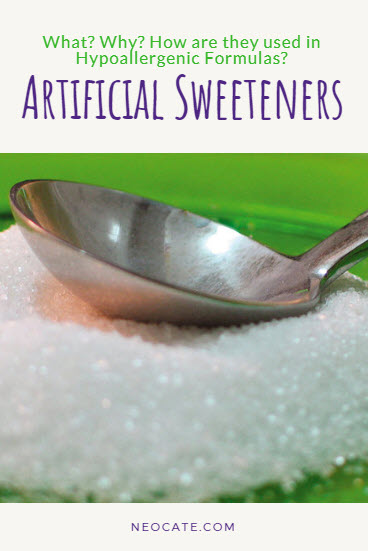 What are artificial sweeteners?
What are artificial sweeteners?
Artificial sweeteners are altered versions of naturally occurring compounds. These altered versions taste sweet or sweeter than regular sugar and are called “high intensity” or “non-nutritive” sweeteners. Very small amounts of artificial sweeteners can be used in foods to match the sweetness of sugar.
Why are artificial sweeteners used?
Artificial sweeteners usually replace sugar in foods and beverages. Their use is a way to reduce the calories in beverages, like diet sodas. Also, these are used in sugar-free candies and desserts designed for people with diabetes. This is helpful for people who must be careful about and monitor their sugar and carbohydrate intake.
What about in hypoallergenic formulas for children?
In hypoallergenic formulas for children over 1 year of age, like some Neocate formulas, artificial sweeteners are used in place of simple sugars. (But not for weight loss!) And we should note that artificial sweeteners are not used in our infant products, they’re only in products for those 1 years of age and older.
They’re used because hypoallergenic formulas can have strong tastes, and the best way to improve their taste is to increase the sweetness. Ordinarily, this would require a lot of natural sugar. So much that the formula would become unhealthy and not nutritionally balanced. Using small amounts of artificial sweeteners means that the taste of the formula can be improved without adding loads of sugars.
What about sweeteners in Neocate®?
Several Neocate formulas use an artificial sweetener: one single sweetener apiece. Therefore, any Neocate formula with an artificial sweetener will only use a single artificial sweetener. This is because some families prefer a specific artificial sweetener, so this provides them with choices. Other formula brands might use multiple artificial sweeteners in a given formula (to try to match the sweetness profile of sugar).
Most of the flavored Neocate formulas use sucralose, which has a balanced sweet profile and has been popular in recent years. A few of the flavored Neocate products use acesulfame potassium, which works well with citrusy flavors.
| Neocate Products | Artificial Sweetener |
| Neocate® Syneo® Infant | None |
| Neocate® Infant DHA/ARA | None |
| Neocate® Nutra | None |
| Neocate® Syneo® Junior, Unflavored | None |
| Neocate® Junior, Unflavored | None |
| Neocate® Splash, Unflavored | None |
| Neocate® Junior, Chocolate | Sucralose |
| Neocate® Junior, Vanilla | Sucralose |
| Neocate® Junior, Strawberry | Sucralose |
| Neocate® Splash, Grape | Sucralose |
| Neocate® Splash, Orange-Pineapple | Sucralose |
| Neocate® Splash, Tropical Fruit | Acesulfame Potassium |
Learn more about carbohydrates used in Neocate.
Have you tried a flavored Neocate formula yet? How did you like the taste? We always enjoy hearing from you!
-Rob McCandlish
 Rob McCandlish is a registered dietitian nutritionist (RDN) who joined the Nutricia team in 2010. He has years of experience at Nutricia following food allergy research, working with Neocate products, talking with Neocate families and learning about the science behind Neocate and food allergies. Both of his nephews used Neocate for their cow milk allergies!
Rob McCandlish is a registered dietitian nutritionist (RDN) who joined the Nutricia team in 2010. He has years of experience at Nutricia following food allergy research, working with Neocate products, talking with Neocate families and learning about the science behind Neocate and food allergies. Both of his nephews used Neocate for their cow milk allergies!
Last edited July 26, 2024.






